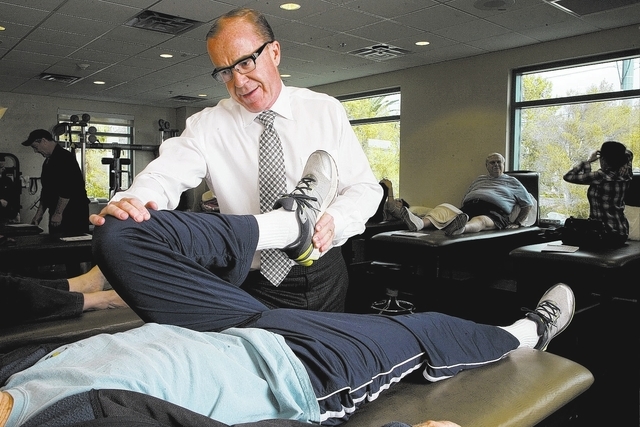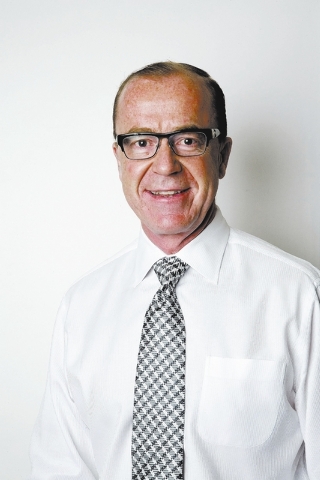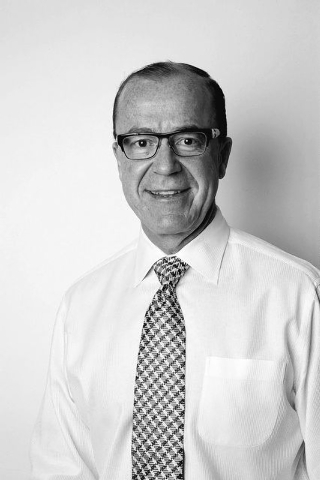Nevadan at work: Physical therapist has had varied 30-year career in Las Vegas
It’s been an unusual ride for local physical therapist Matt Smith.
He got to pet baby tigers while working with patient Roy Horn.
Nor will Smith forget the patient given a 2 percent chance of living, yet who now has a normal life.
And then there was the time another patient, Bill Bennett, made Smith president of the Sahara for a year.
Yes, Smith, president and CEO of the 12-office Matt Smith Physical Therapy, has had an interesting 30-year career in Las Vegas. Today, Smith is as much administrator as physical therapist, grappling with a changing insurance landscape and making plans to expand. Regardless of how his day-to-day responsibilities change, Smith said his goal is the same: to change people’s lives.
Smith also applies that philosophy to his nonprofit work — efforts that earned Smith and his wife, Kami, honors at February’s annual Hope Gala of the JDRF.
Question: Why did you want to become a physical therapist?
Answer: After we graduated from high school, my best friend got hit on his motorcycle. This large Oldsmobile put him in the gutter, and he ended up being paraplegic. I watched his recovery, and saw what was going on in the hospital with therapists and everybody else. After he was sent home, I would go to his outpatient visits with him. I was really impressed with the care and the compassion in what they were doing. It’s a person business if there ever were one.
Question: You’ve worked with a lot of interesting people. Any stories you can share?
Answer: I’ve treated professional tennis players and taken care of some of the wealthiest casino executives in town. I’ve taken care of one of our young, up-and-coming, iconic athletes, Bryce Harper (a Washington Nationals outfielder). From Claudia Schiffer to Kenny Rogers, you name it. I’ve seen a lot of people, but that just means I’ve been here a long time.
I worked with Roy Horn prior to and after his injuries (following a 2003 tiger attack onstage), often at his private residence. Roy’s a very athletic performer. He would get injured sometimes on an elephant, or doing various stunts. One time, in his room, they had this big, glass pen, and they had baby tigers in there.
Question: You probably never thought you’d pet baby tigers as a physical therapist.
Answer: Not at all. Vegas brings interesting opportunities, I will tell you that.
Question: It also brought you the opportunity to run a hotel. What was that about?
Answer: Bill Bennett, the president of the Sahara Hotel Casino, was a patient (in the late 1990s). I had just resigned from HealthSouth. He said, “Come and get into gaming.” I told him I had no gaming experience, other than playing poker or blackjack. He pulled out a (profit/loss statement) and said, “Read this.” It made sense to me, because I had looked at them before. So he hired me, and on Day One, he put me in as president. It lasted a little over a year. I had gone through a divorce, and was working the day shift, graveyard and swing. It was time for me to get back into a normal lifestyle. So I got back into health care and never looked back. I started my current practice in 2000.
Question: What’s the most amazing recovery you’ve seen?
Answer: One was a gentleman who worked at a bank, and who was involved in a horrific motorcycle accident (in 2011). His aorta was severed, and he was given a very small chance of survival (Wells Fargo Bank manager George Lawes had a 2 percent chance of surviving, and had a broken vertebra, ribs and shoulder bones). He’s probably one of the most remarkable cases I’ve seen. We saw him when he finally got out of the hospital, and we saw him go back to work.
With motorcycles and quads, when you have rollovers, people are just exposed to the environment, and the trauma can be significant.
Question: Would you ever ride a motorcycle or quad?
Answer: I don’t have one, I won’t have one and I won’t let my kids have one. The most catastrophic injuries we see are from those two items. You have the acceleration of the vehicle, and the entire body — especially the head — is exposed to whatever you hit.
Question: What makes a good physical therapist?
Answer: You have to be smart. You always have to be learning, studying, reading, going to courses. But I’ve seen people with book smarts who didn’t have that connectivity with people. If you don’t have a lot of passion for human beings, then this is not your profession. We don’t offer you an injection, we can’t give you a prescription. It’s not a restaurant where you get a delicious meal, or a bar where you get a nice glass of wine. You have an experience when you see a physical therapist. That’s all you get. We have to be very people-centric, with a lot of listening and empathy.
Question: What makes a good patient?
Answer: Someone who is vested in their own recovery, who understands and takes ownership of getting better. Quite often, we have people who don’t want to do their home exercises or work out at the gym. They may see us one, two or three times a week for 60 to 90 minutes, which is not much in the span of getting better. It can be overwhelming because of the pain and medication. People get depressed, so it’s difficult. But you kind of know from Day One if patients will be on the fast track, or if we’re going to be dragging them to the finish line.
Question: How has the Las Vegas medical community changed in 30 years?
Answer: The consolidation on the payer side is big. With insurance through an employer, you have five options anymore, where you used to have 20 or 30. And with the corporatization of health care, we’ve seen consolidation of primary care and specialists. You have bigger outside entities coming in. It’s no longer a small, mom and pop town medically. It’s corporate-driven. I’m not saying that’s a bad thing. It’s just something that’s happened.
Question: How has it affected the way you practice?
Answer: We have had to change our business model over the years because of reimbursement and market consolidation. I don’t think there’s any practitioner in this city who is not being pushed to see more patients to make ends meet. That’s the reality of medical care.
Question: How is the Affordable Care Act changing things for your business?
Answer: We’re seeing a little uptick in people who have access to Medicaid, and now have access to our services. From the (state) health care exchange, we haven’t seen a huge increase in enrollees. But all in all, it’s given more people access to our services, which today, I would say, is a good thing.
Question: What do you like best about your work?
Answer: Our company mantra is “changing lives.” That has been very rewarding for me, helping patients get back to work and play and life. We’ve also tried to take that sense of changing lives through therapy and implement it in the community with charitable programs we do quarterly. We just finished a Three Square food drive, and we do a clothing drive for an at-risk school in the fall. We do a Christmas toy drive, and we are involved in JDRF (formerly known as the Juvenile Diabetes Research Foundation). It’s important to me that my 150 employees know I care about the community, and I want them to care about the community, too.
Question: What do you like the least?
Answer: The regulatory oversight is more burdensome every year, and with less reimbursement.
Question: What is your biggest accomplishment?
Answer: As a therapist, the business side of it. Vegas has been very kind to me and my family, and it has helped us find the success we have. But the most joy I get out of my day is when I’m taking care of a patient. It concerns me that the day is coming where I will be not doing very much of that. It’s a harsh reality, but it’s where the business cycle takes a CEO as a business expands.
Outside of work, I’ve got four fantastic kids. I’d say I’m most proud of my babies.
Question: What are your career goals?
Answer: We are raising capital to expand our model into other markets. We have a business plan to expand our platform, which we have spent a lot of time and money making scalable. I’ve had the fortune of hiring a really good management team that’s competent, driven and hard-working. Also, because of baby boomers, the amount of total joint replacements is increasing exponentially. We refuse to get old. We want to live forever. We want to play sports forever. I think our profession is only going to be more relevant in the future.
Contact reporter Jennifer Robison at jrobison@reviewjournal.com or 702-380-4512. Follow @J_Robison1 on Twitter.



















